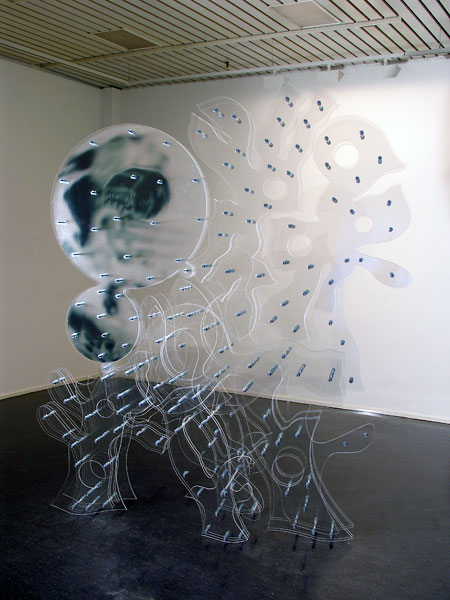MARTTI AIHASculptures 28.4.2007 – 20.5.2007
 Vaassila, 2007
Vaassila, 2007acrylic plastic sheet, print, galvanized metal
The pieces
exhibited by Martti Aiha consist of sculptured wall reliefs and
free-standing sculptures that claim the space around them as well as
drawings and miniature sculptures. In his new work, Aiha continues to
examine the fundamentals of the visual arts in his signature style,
readily identifiable yet constantly experimenting with new materials and
methods of presentation.
The wall reliefs, done in woodcuts and acrylic paint on squares of
plywood, exhibit a painting-like quality. Other reliefs consist of
flatly layered acrylic sheets of various colours and shapes. The overlap
of the planes and the changes of light create a painting-like
impression on the surface of the reliefs. One might even say that the
two-dimensional space of painting has been given a three-dimensional
open structure.
In Martti Aiha´s sculptures, the spatial dimensions of the
horizontal and the vertical as well as the tensions arising between
these take control. Nonetheless, the sculptures refute the traditional
sculptural philosophy of highlighting mass and gravity, as their airy
structures mainly consist of transparent acrylic sheet, and instead
underscore the qualities of immateriality, incorporeality and
weightlessness. All in all, Martti Aiha in his most recent works seems
to intensely draw on traditional aesthetic values and formalistic
principles.
The shapes of Martti Aiha´s work describe if not outright depict
the real world. The highly abstracted pieces give rise to a wide range
of images despite almost always being based on a clear motif such as the
human figure. The subject matter throughout is rooted in the classical.
The plywood reliefs, for example, feature motifs of mother with child
and nature, while the acrylic reliefs may start out with a motif such as
the eye, yet appear abstract due to the large scale of the piece.
In two large sculptures he has named Vaassila, Martti Aiha
addresses the personal significance to him of the Finnish national epic
Kalevala, whose world Aiha portrays through his own philosophy. Vaassila
Kieleväinen was a wise man and master of incantation and epic poetry
from the village of Vuonninen. It was his discussions with Kieleväinen
that inspired Kalevala compiler Elias Lönnrot to create the continuous
Kalevala epic from the poems he had collected. The impetus to the
Vaassila pieces came to Aiha through a search for his own distant family
roots, a desire to walk in the footsteps of his forefathers.
Overall, Martti Aiha notes that he always needs a tangible topic as
his point of departure. It is this that sets the mood for the piece.
What remains in the finished work is often just this: an intense and
instinctive personal experience. At the same time, Aiha´s work strongly
exhibits the ornamental, flame-like living shape that has become his
trademark - like the individual brushstroke of the artist.
Rauli Heino
